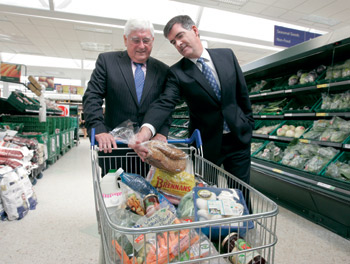Attack of the giants

The battle for global retail supremacy is heating up between Tesco and Wal-Mart. But which retailer will ultimately win the hearts and minds of its customers?
20 May 2011
 The recent controversy surrounding Tesco’s “over 1,000 price cuts” campaign generated reams of negative column inches for the retailing giant. It can’t be disputed that consumers should be able to make an informed decision on where they shop, based on whether or not real value is available in a particular outlet. However the extent of Tesco’s comprehensive drubbing caused us to ponder more on the nature of publicity that the multiple receives in this country.
The recent controversy surrounding Tesco’s “over 1,000 price cuts” campaign generated reams of negative column inches for the retailing giant. It can’t be disputed that consumers should be able to make an informed decision on where they shop, based on whether or not real value is available in a particular outlet. However the extent of Tesco’s comprehensive drubbing caused us to ponder more on the nature of publicity that the multiple receives in this country.
The supermarket’s PR gurus certainly do their best to draw attention to the group’s positives – always speedily sending off the good news press release, but mysteriously becoming a good deal more belligerent whenever there’s questions to answer – albeit not quite to the same extent as its rival – the eternal media-recluse that is Dunnes Stores.
Job announcements are PR gold
A brief re-cap of newspaper headlines flags up the chain’s much touted ‘glory days’; last month it created 200 jobs at a new supermarket in the Millfield shopping centre on the outskirts of Balbriggan, north County Dublin. What’s more, the group launched a €113 million national investment plan last year that boldly proclaimed it would create 748 new jobs. Yet despite the obligatory coverage of these apparently happy events, it seems a bad news day is never too far away for Ireland’s favourite supermarket in the ‘we love to hate you’ stakes.
Of course, trying to paint the retailer, which last year piled up annual profits of a record £3.8 billion (€4.3 billion), as any sort of victim, let alone at the hands of a grisly Irish media, would clearly topple into the realms of the ridiculous. Furthermore, many Irish people are clearly happy to regularly shop at Tesco. This suggests that attempts to single out Tesco from the other multiples and depict it as the bogeyman of Irish grocery, have not proved particularly effective. The latest market statistics from Kantar Worldpanel in Ireland, published for the 12 weeks ending 17 April 2011, show Tesco actually posted a slight increase in growth of 1.6%, expanding its market share from 26.9% last year to 27.1%. In comparison, Dunnes and SuperValu actually dropped market share slightly compared to last year from 23.7% to 23.6% and 19.8% to 19.5% respectively.
Why not publish profits?
If Tesco really wanted to give its naysayers food for thought however, it could always simply publish its Irish profits. A reluctance to do so naturally raises the question: what’s Tesco trying to hide? One answer was put forward by the UK stockbroker Shore Capital, which last year reported Tesco makes greater profits in Ireland than in any other part of its global empire apart from South Korea.
And let’s not ignore the elephant in the room either, Tesco is not Irish, but British – a fact that doesn’t exactly endear it to a patriotic home-crowd. It’s all too easy to conjure up pictures of highly-paid members of Tesco HQ sitting in their Cheshunt, Hertfordshire offices; deciding how they can further fleece the ‘paddies’ in order to siphon off ever greater profits into their own bank accounts. A scenario that’s actually not too far from reality, according to one former Tesco employee who recently spoke to The Irish Times. He said buyers faced “relentless pressure” to deliver increased profits that could be sent back to the UK parent. He also claimed the company behaved differently in the UK because it had two very strong competitors in the form of Asda and Sainsbury’s, whereas, “in the Republic, they see themselves as invincible.”
Another supplier claimed decisions about the chain’s Irish operations were increasingly being taken in the UK, “over the heads of the Irish guys.”
While Tesco is certainly not beyond reproach therefore; its actions should be considered in the context of what its competitors are doing. Dunnes Stores doesn’t release its profits either, and the Musgrave Group does not break profits down according to individual retail brands. As Clive Black, an analyst with Shore Capital pointed out: “It may be easy to hit Tesco over its margins but you need to look at its competitors too.”
A greater focus may also be placed on Tesco because it’s Ireland’s largest grocery operator (with Dunnes following in hot pursuit). Possibly the chain has come to embody all that’s wrong with large supermarket operators and a concern that the unbridled capitalism they pursue is destroying our local communities. Perhaps ‘Tesco-polisation’ may even appear as an official word in dictionaries in the not-too-distant future!
The American nightmare
Tesco’s dire publicity of late, reminded us of the book published by American journalist Bill Quinn in 2000, pithily entitled: ‘How Wal-Mart is destroying America (and the world) – And what you can do about it.’
It could be argued that as America’s (indeed, the world’s) largest retailer, Wal-Mart is a sitting target for anyone wanting to rid themselves of the planet’s capitalist evils. However, Quinn believes it is Wal-Mart’s policies in and of themselves, that are the problem. He even provides several examples of other large retailers who he believes haven’t stooped to the morally redundant depths of the “Bentonville blankety-blanks” – Bentonville being the town from which the group’s founder Sam Walton hails.
Bearing the research of this “feisty small town Texas grandpa” in mind, we decided to see how the two supermarket players squared up to each other in terms of their company ethics.
Effect on the local community
Bill Quinn believes Wal-Mart deliberately target traditional businesses when it enters a town through “predatory pricing.” As he explains: “A new Wal-Mart on the offensive against its local competition will be willing to take losses on merchandise that those competitors sell. It’ll study what [they] sell and then sell it for less.”
What’s more, he reports the Arkansas Press Association did an informal price survey, which found “prices for the same products are not the same at every Wal-Mart outlet. If there is a Target or Kmart store nearby, that Wal-Mart’s prices are forced lower.”
Wal-Mart doesn’t pay much heed to whether a particular area actually wants its presence either, according to Quinn, who claims, “Wal-Mart will come to town even when faced with a helluva fight.” Evidence of aggressive expansion policies – whether or not an area actually wants a new store, could be seen in action in Bristol recently. Violent riots occurred when Tesco attempted to open its 18th store in the city, in the Stokes Cross area.
Local woman Sam Allen, wrote in a Guardian comment piece, that while she didn’t condone the violence, it had erupted due to people’s voices being ignored.
“More than 2,500 petition cards were sent to Bristol City Council objecting to Tesco and 96% of the 700 people surveyed said they didn’t want another supermarket,” she said. However Tesco obviously didn’t agree with those 2,500 petitions and announced that the store would be open soon, adding that, “local businesses and residents wanted it back.” Not exactly the most comprehensive response ever!
Treatment of employees
According to Quinn, “Of the hundreds of places Wal-Mart can (and does!) save money, its workers’ hides are the favourite. Minimum wages and minimum benefits: that’s the way Wal-Mart stays ultra-competitive.” He also points out that Wal-Mart defines “full-time” as 28 hours or more, instead of the usual 40 hour week. The result? “Many – too many – Wal-Mart employees must be on food stamps or other government assistance. This reality can be a bitter pill for folks in some towns who welcomed Wal-Mart and its promise of additional jobs.”
On Tesco’s website meanwhile the group states: “We invest in our people to give them the best and get the best from them.” Indeed, here at ShelfLife, we know of many people who have gained valuable retailing experience through working at Tesco. That said, the supermarket has not featured on the Great Place to Work Institute list of Ireland’s top employers, between 2003 and 2011 – a feat that McDonald’s has consistently managed to achieve. Perhaps achieving an accolade of this nature would help quell Tesco’s detractors?
Studies showing the extent of job displacement caused by the supermarkets – claiming that for every 20 jobs created, another 30 are lost in the wider community – have also been well publicised. The effect on overall jobs in the areas ‘enhanced’ by Tesco’s recent €113m national investment programme, is therefore an issue to watch in the near future.
Treatment of suppliers
Quinn delivers another frank appraisal of Wal-Mart’s misdeeds on the subject of suppliers. “Because Wal-Mart is so big, it can (and does!) demand just about anything it wants from its vendors, anything from deeper-than-usual discounts to downright disadvantageous shipping policies to enforced returns on slow-moving merchandise.”
The author even spoke to one former manager who had a “complaint” employee. His main job was to “tell vendors that the product was not received or that the pallets it came on were damaged… [Then] when Wal-Mart claimed damage (which was often), vendors had to take Wal-Mart’s word on it – or lose a huge customer.”
No one has ever mentioned anything as damning as a “complaint” policy from Tesco, yet its reputation has not remained entirely unbleached. Suppliers who are still working with Tesco are understandably reluctant to talk to the media about their relationship, yet an anonymous survey carried out by ShelfLife, found 95% of suppliers surveyed admitted they were coming under increased pressure to supply goods to retailers under unfavourable terms. However not all criticism focused on Tesco.
Dunnes Stores was actually said to be the most severe with its demands although Tesco had been the main perpetrator in delisting products. When asked to respond to ShelfLife’s findings by journalist Philip Boucher-Hayes in the RTE documentary, ‘What’s Ireland Eating?,’ the supermarket appeared unrepentant – stating it was merely “firm” in its dealings with suppliers in order to drive greater value for customers.
International expansion
Tesco recently said it plans to nearly double its selling space in central Europe and Turkey to 4.1m sq metres over the next five years. It has 850 stores in Poland, the Czech Republic, Hungary, Slovakia and Turkey and claimed it would expand with its convenience-style Express outlets as well as small and large hypermarkets.
The retailer added that it planned to quadruple its sales in China to £4bn by the 2014 financial year. Wal-Mart meanwhile, has entered buyout negotiations with the management of Massmart, which runs 290 stores in 13 African countries under brand names such as Makro, Game and Builders Warehouse. This offer is the latest move in an expansion strategy which took the retailer into India and Chile last year.
Of course, Wal-Mart is the world’s largest retailer, while Tesco is ‘only’ its third (after France’s Carrefour). But at least Tesco CEO Philip Clarke’s seven-point “new vision” for the global supermarket chain, sounds an ethically pleasing note. One point states Tesco will “put our responsibilities to the communities we serve at the heart of what we do.”
Ireland should sincerely hope that Clarke achieves his vision and that this pledge is not simply a case of style over substance. After all, such ideals could have a significant knock-on effect on Ireland’s agriculture and food industries.



 Print
Print






Fans 0
Followers